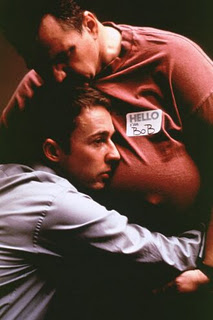 Emasculation becomes a central theme in Fight Club as it is portrayed by the narrator Jack. William Romanowski, in Eyes Wide Open states, “Emasculated by the consumer culture…Jack finds solace (though under false pretense) in a support group for men with testicular cancer: (The castration metaphor is obvious.) There he meets Bob, a former body builder; who has developed feminine features resulting from his cancer treatment. Trying to comfort the sobbing Jack, Bob rasps in a high pitched voice, ‘We’re still men,’ with Jack affirming “Yes, we’re men. Men is what we are.”Consumer culture emasculates by fostering false idealized images that motivate men to change what and who they are: men. They run longing for this idealized image to which Tyler, Jack’s idealized alpha-male alter-ego helps to free Jack from this burden. At the outset of the film we find the emasculated Jack seeking solace and identity in consumable products rather than in himself…whatever that may look like. In an early scene where Jack and Tyler first appear in the same shot, sitting side by side on the airplane Tyler reads the emergency instruction card to which Jack replies something about the great responsibility that seat has to open the emergency door. Tylerasks if he would like to switch seats to which Jack replies, “I’m not sure that I am the man for that job.” Lack of confidence, or sense of responsibility Jack declines as a symptom of the emasculated male. In one scene Jack describes the relationship between he and Tyler as, “Most of the week we were like Ozzie and Harriet.” We are not confused who is whom in this analogous pairing. In another scene at Marla’s apartment, Marla says to Tyler, “Oh Don’t worry he’s (referring to a dildo) not a threat to you.” As the alpha-male, sure of his virile sexuality, Tyler is not threatened by a wobbling gelatinous penis on the dresser. And yet, earlier when Jack, the emasculated male is at the airport, the attendant insinuates that Jack’s missing luggage may have been a result of a vibrating dildo. Craig Detweiler in his book, A Matrix of Meanings says, “A longing for God and fathers informs every frame of Fight Club” (p. 42.). We see this theme boy with out father-figures recurring throughout the film. In a later poignant scene, the two men sit and discuss their fathers. Jack: “I can’t get married, I’m a 30 year old boy.” Tyler: “We are a generation of men raised by women…I’ wondering if another woman is really the answer we need.” Elsewhere in the film Tyler asks, “Our fathers were our models for God. If our fathers bailed, what does that tell you about God?” Our culture’s lack of fathers point of orientation in development renders an incomplete identity that must be filled by things. Ultimately the we are shown what it means to be a man by those products rather than our fathers. Jack narrates to the audience, “I felt sorry for guys packed into gyms, trying to look like how Calvin Klein or Tommy Hilfiger said they should look.” And turning to Tyler asks, “Is that what a man looks like?” Later Tyler responds to similar thoughts in a monologue to the local fight club, “Man, I see in fight club the strongest and smartest men who've ever lived. I see all this potential, and I see squandering. God damn it, an entire generation pumping gas, waiting tables; slaves with white collars. Advertising has us chasing cars and clothes, working jobs we hate so we can buy shit we don't need. We're the middle children of history, man. No purpose or place. We have no Great War. No Great Depression. Our Great War's a spiritual war... our Great Depression is our lives. We've all been raised on television to believe that one day we'd all be millionaires, and movie gods, and rock stars. But we won't. And we're slowly learning that fact. And we're very, very pissed off. We have been sold a false bill of goods and the scales have fallen from our eyes. The mute now have a voice to combat the culture…to give an expression to their (and ours) discontent. Tyler represents Jack’s desire to be a strong male rather than the passive slave to culture. And we are left to ponder our own emasculation. Are we simultaneously repulsed by Jack’s emasculation and attracted to Tyler’s freedom? If so, is that symptomatic of our own emasculation? This is your new blog post. Click here and start typing, or drag in elements from the top bar.
0 Comments
Your comment will be posted after it is approved.
Leave a Reply. |
Ryan StanderArchives
January 2018
Categories
All
|

 RSS Feed
RSS Feed
